This is one of the best times of the year. For nearly two months, accomplished individuals across the nation take to stages in gymnasiums, arenas, theaters and football stadiums to reveal secrets in front of thousands of individuals. Thanks to the rise of university YouTube accounts and sites like Graduation Wisdom, now not only do parents of graduates and university faculty and staff get to take in these great talks, with just a few clicks we have nearly instant access to the videos and transcripts, too.
The lessons shared in the hundreds of commencement speeches each year are as diverse as they are plentiful. A speech nerd myself, I keep on top of the news to catch what's heralded as the best, and as a constant learner, I try to pull out parts that I can apply.
The following list offers a dozen pieces of applicable business advice extracted from speeches as recent as last month.
"Make your bed every morning."
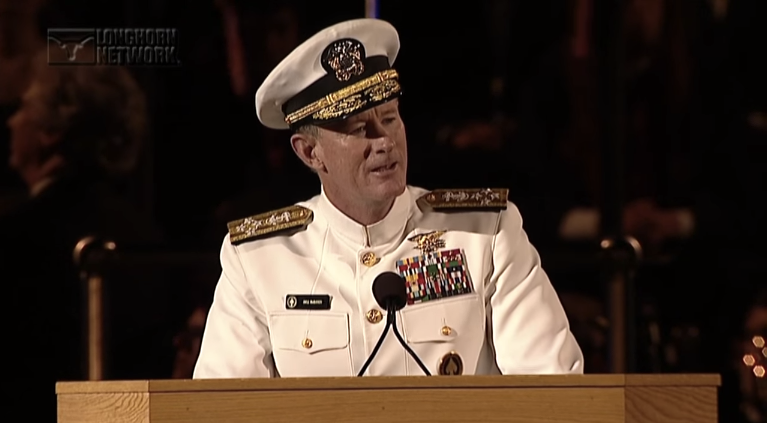
Naval Adm. William H. McRaven
In what turned out to be one of this year's best graduation speeches, Naval Adm. William H. McRaven, ninth commander of U.S. Special Operations Command, shares ten lessons he learned from basic SEAL training.
His first lesson: "If you want to change the world, start off by making your bed."
Every morning we were required to make our bed to perfection. It seemed a little ridiculous at the time, particularly in light of the fact that were aspiring to be real warriors, tough battle hardened SEALs—but the wisdom of this simple act has been proven to me many times over.
If you make your bed every morning you will have accomplished the first task of the day. It will give you a small sense of pride and it will encourage you to do another task and another and another. By the end of the day, that one task completed will have turned into many tasks completed. Making your bed will also reinforce the fact that little things in life matter. If you can’t do the little things right, you will never do the big things right.
And, if by chance you have a miserable day, you will come home to a bed that is made—that you made—and a made bed gives you encouragement that tomorrow will be better.
University of Texas at Austin, 2014
Watch the Speech | Read the Transcript
"Be your weird self."
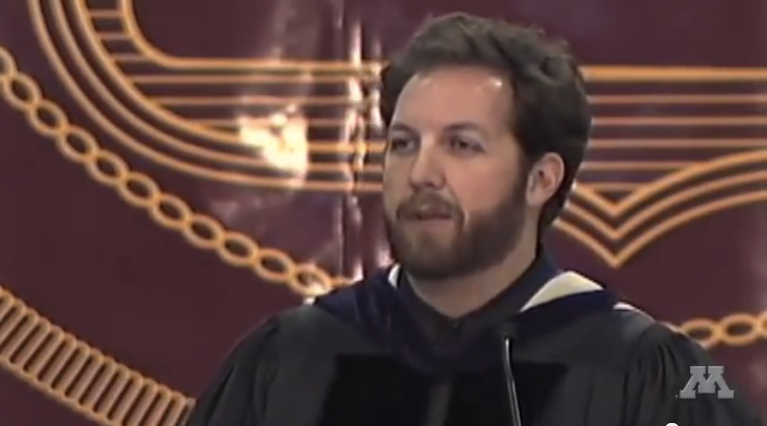
Chris Sacca, venture capitalist
Chris Sacca, venture capitalist and former Head of Special Initiatives at Google, framed his address around a question: What is success? His answer: happiness. And to set the graduates off on the right foot, he offered a seven-step roadmap for reaching happiness.
His second to last step, which he introduces as his most "important piece of advice" that day, is to "be your weird self."
It takes too much energy to be anything but your weird self. […] Everyone here is weird, admit it. We each have our quirks. Celebrate those, be goofy, tell corny jokes, dance awkwardly, express your half-baked thoughts but most importantly laugh about your failures. […]
It’s our collection screw-ups and idiosyncrasies and memories and stories and lessons learned that make us weird and interesting. I mean, weirdness is why we adore our friends. I can see the weirdness in mutual recognition of weirdness in your eyes as you look around at each other. Weirdness is what bonds us to our colleagues. Weirdness is what sets us apart and gets us hired. Be your unapologetically weird selves.
Carlson School of Management - University of Minnesota, 2011
Watch the Video | Read the Transcript
"Working on an exciting problem is fun."
Drew Houston, Dropbox co-founder
Dropbox co-founder Drew Houston offers graduates a "cheat sheet" for what's to come after graduation. "Nobody tells you that after today, the recipe for success changes," he says.
Houston shares his advice by recounting his own entrepreneurial journey, from founding an SAT prep software company at age 21, to reading business books atop his fraternity house to co-founding the file management startup not long after graduation.
I was going to say work on what you love, but that's not really it. It's so easy to convince yourself that you love what you're doing—who wants to admit that they don't? When I think about it, the happiest and most successful people I know don't just love what they do, they're obsessed with solving an important problem, something that matters to them.
They remind me of a dog chasing a tennis ball: their eyes go a little crazy, the leash snaps and they go bounding off, plowing through whatever gets in the way. […] The hardest-working people don't work hard because they're disciplined, they work hard because working on an exciting problem is fun.
MIT, 2013
Watch the Video | Read the Transcript
"Manufacture your own opportunities."
Biz Stone, Twitter co-founder
Twitter co-founder Biz Stone tells four stories to illustrate lessons he's learned in and outside of business. His first is about opportunity and it recounts an episode from his high school years in which he started up a lacrosse team. His reason for doing so: he didn't play any of the popular sports at the time because his childhood summers were filled with other activities.
By the time I got to high school and I wanted to be on one of the sports teams, I had no idea what I was doing. […] This of course meant that I was not going to get on any of the teams—what coach wants a kid that doesn’t even try? So I launched an investigation.
My research lead me to discover that there was a sport that my high school did not offer at the time—lacrosse. If nobody knew how to play lacrosse, then everybody would be as clueless as I was. So, I approached the school administration and asked, "If I can find a coach and enough boys, can I start a lacrosse team?" They looked at me and said, "Sure kid." So, that's what I did—I found a coach, rallied some boys and formed a scrappy lacrosse team. With my intimidation gone, it turned out that I was really good a lacrosse, the others elected me captain, and we were a good team. […]
Yes, you can wait around for the right set of circumstances to fall into place and then leap into action but you can also create those set of circumstances on your own. In so doing, you manufacture your own opportunities. This is as true for high school sports as it is for entrepreneurism or corporate culture. It has helped me immeasurably.
Babson College, 2011
"If you’re offered a seat on a rocket ship, don’t ask what seat. Just get on."
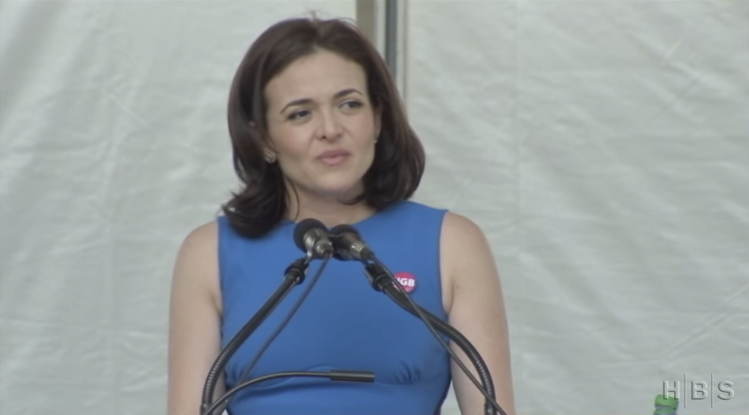
Sheryl Sandberg, Facebook COO
Facebook COO and author Sheryl Sandberg takes business school graduates through her career—from her days in government to accepting a position to work with then 23-year-old Mark Zuckerberg—and highlights lessons learned along the way. One of those lessons came in 2001, from then new CEO of Google, Eric Schmidt. Sandberg and he had sat down to discuss an open position at Google, one of several she was considering.
I had a few (job) offers and I had to make a decision. So what did I do? I'm MBA- trained; I made a spreadsheet. I listed my jobs in the columns and my criteria in the rows, and compared the companies and the missions and the roles.
One of the jobs on that sheet was to become Google’s first Business Unit General Manager, which sounds good now, but at the time no one thought consumer Internet companies could ever make money. I was not sure there was actually a job there at all. Google had no business units, so what was there to generally manage. And the job was several levels lower than jobs I was being offered at other companies.
So I sat down with Eric Schmidt, who had just become the CEO, and I showed him the spreadsheet and I said, 'This job meets none of my criteria.' He put his hand on my sheet and he looked at me and said, 'Don’t be an idiot.' Excellent career advice. And then he said, 'Get on a rocket ship. When companies are growing quickly and they're having a lot of impact, careers take care of themselves.' And when companies aren’t growing quickly or their missions don’t matter as much, that’s when stagnation and politics come in. If you’re offered a seat on a rocket ship, don’t ask what seat. Just get on.
Harvard Business School, 2012
Watch the Video | Read the Transcript
"Try never to be the smartest person in the room."
Michael Dell, Dell founder and CEO
Michael Dell poses a seemingly uncomfortable scenario to the graduating class of 2003: "As Dell has grown over the years, many critics have asked me when I would finally step aside and let others run things." Possibly unknown to him that day, almost one year later he did just that. His comments onstage offer insight into how he was able to step back.
The truth is, other people have been helping run things at Dell for a long time. The greatest mistake you can make is thinking you can do it all by yourself.
My most important role at Dell is growing and developing a strong team … and I give all of myself in that effort. I learned very early to surround myself with talented people who challenge convention, offer new ideas, and relentlessly drive for improvement. And to let those people thrive.
Try never to be the smartest person in the room. And if you are, I suggest you invite smarter people … or find a different room. In professional circles it’s called networking. In organizations it’s called team building. And in life it’s called family, friends, and community. We are all gifts to each other, and my own growth as a leader has shown me again and again that the most rewarding experiences come from my relationships.
University of Texas at Austin, 2003
"Find allies rather than adorers."
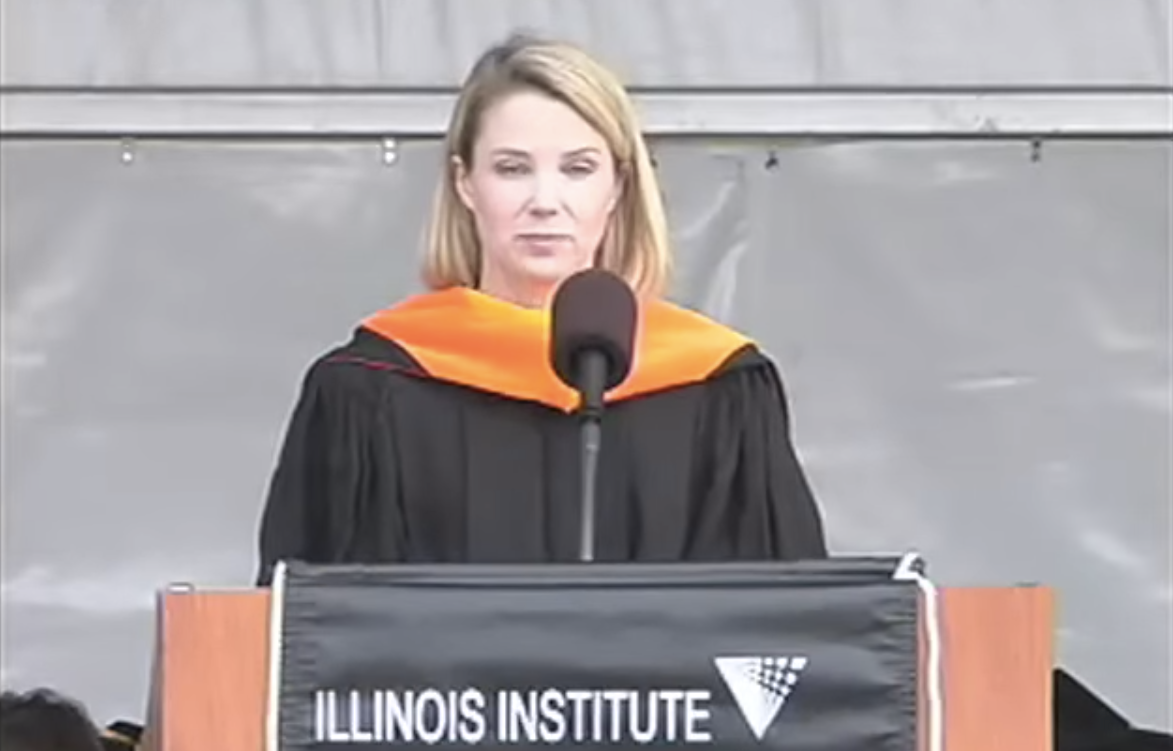
Marissa Mayer, Yahoo CEO
While still in a leadership role at Google, Marissa Mayer dealt out advice to graduates by sharing lessons learned from her career. An important focus of hers is to surround yourself with not only people smarter than you, but people who will be "allies rather than adorers."
Adorers are people who fawn over you, will point out everything you do well, and make you feel great about yourself. And as a result, they're very easy to be around. The downside of adorers is they don't ever tell you when they think you're screwing up, when you're misprioritizing, or when you're making a mistake.
Instead, I encourage you to seek out allies. Allies will tell you when you've done something well, but they'll also be honest with you when they feel you are making mistakes or not living up to your potential. This is especially important in the job market. Work for someone who believes in you and invests in you. Someone who wants you to be better and will be honest with you all along the way.
Illinois Institute of Technology, 2009
Watch the Speech | Read the Transcript
"Think of negativity as noise."
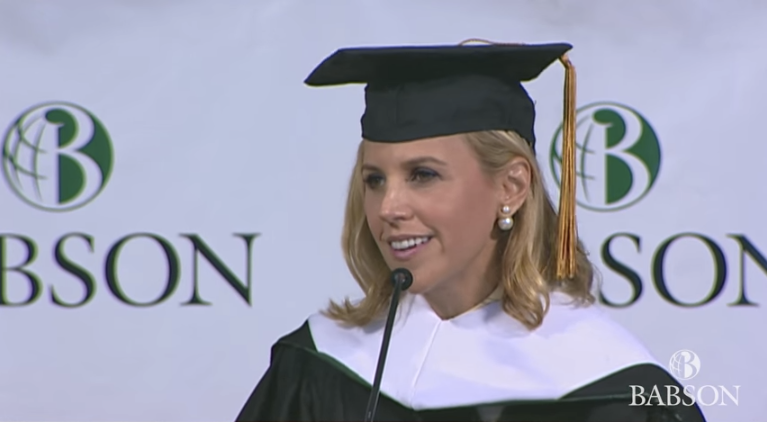
Tory Burch, Tory Burch CEO and designer
Tory Burch, the fashion designer and CEO behind the global women's clothing brand bearing her name, recounts milestones along her entrepreneurial journey.
"After I appeared on Oprah, our website got eight million hits," she tells the graduates. "The media called us an overnight success. I guess that made sense—if you didn’t count the 20,000 hours we put into building the business up to that day, or the combined half a million hours we all spent learning the industry in the years before that."
To conclude her speech, she shares an entrepreneurial principle handed down from her parents.
One of the best pieces of advice I ever received from my parents is to think of negativity as noise. Believe in yourself and what you’re doing.
Remember: if the most unique ideas were obvious to everyone, there wouldn’t be entrepreneurs. The one thing that every entrepreneurial journey has in common is that there are many, many steps on the road to success.
Babson College, 2014
Watch the Speech | Read the Transcript
"Cleverness is a gift, kindness is a choice."
Jeff Bezos, Amazon founder and CEO
To open up his talk, Amazon founder Jeff Bezos tells of an episode from his childhood in which he unknowingly offended his grandmother. While on vacation, he saw an ad that proclaimed each puff of a cigarette takes off two years of an individual's life. His grandmother a smoker, he decided to do the math on her life and report his findings to her.
"I poked my head into the front of the car, tapped my grandmother on the shoulder, and proudly proclaimed, 'At two minutes per puff, you've taken nine years off your life!'" Bezos says. He tells the vivid memory that taught him a life lesson:
I expected to be applauded for my cleverness and arithmetic skills. "Jeff, you're so smart. You had to have made some tricky estimates, figure out the number of minutes in a year and do some division." That's not what happened. Instead, my grandmother burst into tears. I sat in the backseat and did not know what to do.
While my grandmother sat crying, my grandfather, who had been driving in silence, pulled over onto the shoulder of the highway. He got out of the car and came around and opened my door and waited for me to follow. […] We stopped beside the trailer. My grandfather looked at me, and after a bit of silence, he gently and calmly said, 'Jeff, one day you'll understand that it's harder to be kind than clever.'
What I want to talk to you about today is the difference between gifts and choices. Cleverness is a gift, kindness is a choice. Gifts are easy—they're given after all. Choices can be hard. You can seduce yourself with your gifts if you're not careful, and if you do, it'll probably be to the detriment of your choices. […] How will you use these gifts? And will you take pride in your gifts or pride in your choices?
Princeton University, 2010
Watch the Speech | Read the Transcript
"Back up your hard drive."
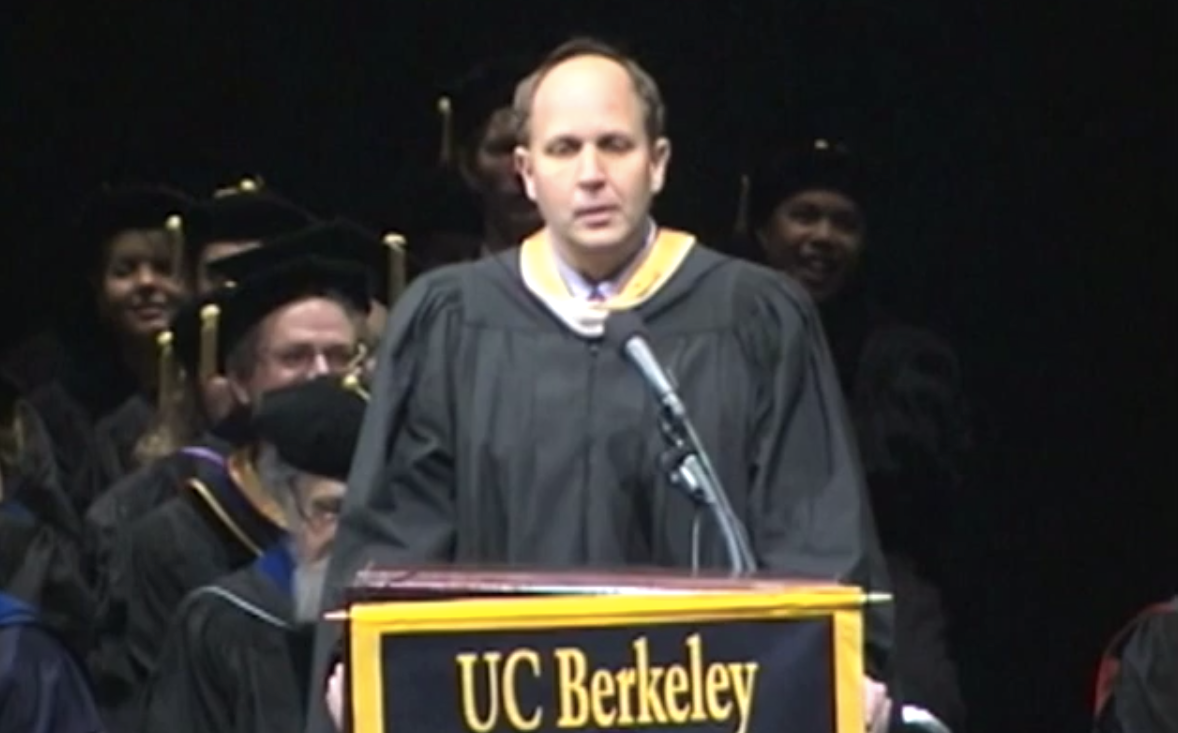
Larry Bock, serial entrepreneur
Serial entrepreneur Larry Bock set the stage to his talk by sharing his state of mind when he received the speaker invitation a year prior. In a London hospital at the time, he was the verge of a nervous breakdown.
"My meltdown was due to a perfect storm of events," he says, which included vision lost, the suicide of his brother, unresolved issues with his late father and an unbridled ambition that could never be satiated.
That life episode gave him time to reflect and what he shares with the graduates are five simple lessons he's learned. His first: "Back up your hard drive."
Even though your life may be cruising along smoothly, every once in a while I recommend that every once in a while you stop and envision a sudden shipwreck occurring. Then think, re-think and remember what you would truly want to hold on to if disaster should strike.
I can guarantee you, you will not be thinking about whether you got tenure, you made partner, or about all the things you acquired, such as the latest Apple iPhone—though I am on the waiting list and I really want one.
You will, I am sure be thinking of the true accomplishments in your life. The building of a rock-solid and loving family, investing yourself in something you're really proud of and the establishing long-lasting and gratifying relationships.
University of California, Berkeley, 2007
"Work is a rubber ball."
Brian Dyson. former Coca-Cola CEO
In what may have been the shortest commencement speech in history, Brian Dyson, the former CEO of Coca-Cola, shared a very powerful metaphor on the importance of maintaining balance in your life.
Imagine life as a game in which you are juggling some five balls in the air. You name them—work, family, health, friends and spirit … and you’re keeping all of these in the air.
You will soon understand that work is a rubber ball. If you drop it, it will bounce back. But the other four balls—family, health, friends and spirit—are made of glass. If you drop one of these, they will be irrevocably scuffed, marked, nicked, damaged or even shattered. They will never be the same. You must understand that and strive for balance in your life.
Georgia Institute of Technology, 1996
"You still have time."
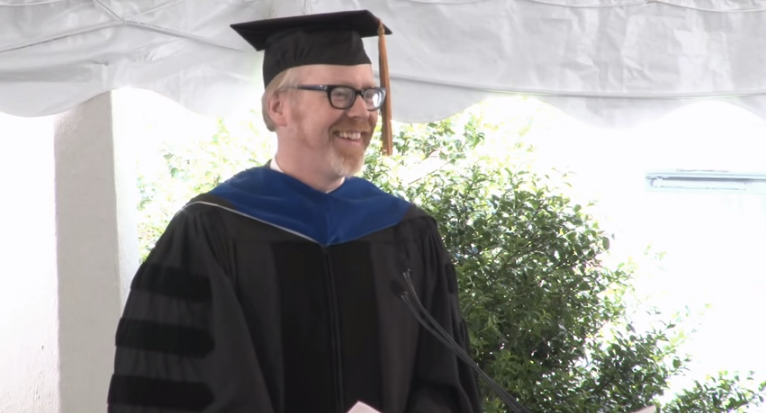
Adam Savage, MythBusters co-host
Closing out a commencement speech full of advice from his television career, Adam Savage reminds graduates that they have "plenty of time." He does so, by rebuking a quote from great American author F. Scott Fitzgerald.
(Fitzgerald) wrote one of the silliest things anyone ever repeats. He wrote the inane quote that, "There are no second acts in American lives." And this is insane. If there's one thing that typifies the American experience it's that reinvention and rebirth are intrinsic to it. There are not only second acts, there are third acts, fourth acts, finales, curtain calls.
Raymond Chandler did not write a single word of fiction until his 40s. Julia Child learned to cook at 40. Clint Eastwood directed his first film at 41. Don't be afraid to be a late bloomer repeatedly.
Remember you have time to figure out what you want to do, who you need to be and where you want to go. You have time to fail. You have time to mess up. You have time to try again. And when you mess that up, you still have time. Just so long as you're willing to work hard.
Sarah Lawrence College, 2012
Watch the Speech | Read the Transcript
More Speech Wisdom
This list of a dozen pieces of advice is only a slice of the free education dispersed annually. What's your favorite piece of business advice from a commencement speech? Please share below and, if online, link up the talk. I'll add it to my must-watch list.
To find more commencement speeches, I recommend these resources:
You might also enjoy this article: "26 Tips on Management, Marketing, Hiring and Productivity Told in AMAs".





